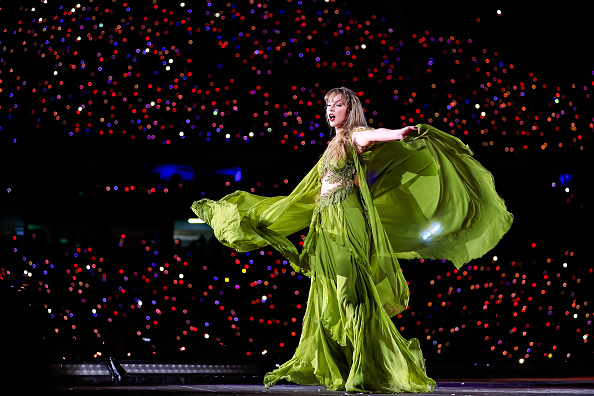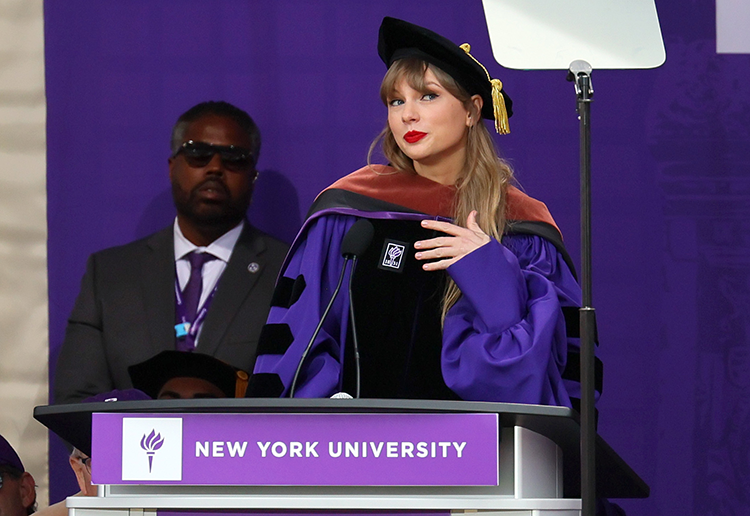Swift Justice: Students learn about the law through Taylor Swift cases

Taylor Swift performs in Rio de Janeiro in November during her record-breaking "The Eras Tour." (Photo by Buda Mendes/TAS23/Getty Images for TAS Rights Management)
As anyone who pays attention to current events knows all too well, Taylor Swift has become ubiquitous.
She’s touring the world, playing to sold out stadiums on her record-breaking “The Eras Tour.” She’s in movie theaters, showing a version of said tour to enchanted Swifties who either couldn’t see her in person or did and want to relive their best day.
She’s at NFL games, trying to bring good karma for her boyfriend, Travis Kelce, and his team, the Kansas City Chiefs. She’s talked about on cable news and social media, as the political world waits to see if she’ll speak now about who she’s endorsing in the 2024 presidential election.
And in at least two law schools, she’s the subject of a class available to students wanting to gain practical knowledge about the law by studying her various legal entanglements and how she emerged stronger.
At the University of Miami School of Law, there was “Intellectual Property Law Through the Lens of Taylor Swift,” a seven-week course taught by Vivek Jayaram, founder of Jayaram Law and co-director of the Arts Law Track in Miami Law’s Entertainment, Arts and Sports Law LL.M program.
Jayaram, who has practiced intellectual property and corporate law for over 20 years, came up with the idea for the class at lunch one day with Gregory Levy, associate dean of Miami Law. Jayaram had just read an article about Swift’s lawsuit with Evermore Park, a theme park in Utah that sued her for trademark infringement after she released an album titled “Evermore” in December 2020.
There were some other lawsuits and legal disputes he had read about involving Swift, including a well-publicized fight starting in 2019 over ownership of her old master recordings that led to her re-recording her back catalogue. There also was a 2014 battle with Spotify over streaming royalties and 2015 deals with JD.com and Alibaba to combat Chinese counterfeiting of her merchandise.
“I said to Greg: ‘I bet Swifties know more about IP law than a lot of lawyers,’” recalls Jayaram, whose favorite Swift album is 1989. “That initiated a bit of a conversation about centering an IP class around her.”
The inaugural class, which met in the spring of 2023, had about 25-30 students. Jayaram says his end game was to use Swift as a means of exploring interesting issues in IP law. He adds that while she was hardly the first artist to experience copyright and trademark issues, she has dealt with them in interesting, innovative ways that have allowed her to experience greater success.
“She’s not the first one who has re-recorded her old songs, but she’s really the only one who has been really successful at it,” says Jayaram, pointing out artists as diverse as The Everly Brothers, Journey and Def Leppard have tried it, with significantly less commercially successful results. “It’s very unusual to do this and have it shoot up to the top of the charts.”
Academics (Taylor’s version)
 Taylor Swift delivered New York University’s commencement address at Yankee Stadium in 2022. (Photo by Dia Dipasupil/Getty Images)
Taylor Swift delivered New York University’s commencement address at Yankee Stadium in 2022. (Photo by Dia Dipasupil/Getty Images)
Another law professor had a similar epiphany—this time, after speaking with some of his students who were excited about going to various shows on her recent “The Eras Tour.” “I thought that she could work as a class,” says Sean Kammer, an environmental and torts law professor at University of South Dakota Knudson School of Law. “I got to work and started from the point of view of what are the ways we can use Taylor Swift and her music to learn about the law?”
Kammer’s class, called “The Taylor Swift Effect,” does not just focus on IP law—instead, it looks at various issues, including how Swift’s songwriting and storytelling can help lawyers become better advocates.
“We look at questions that are more theoretical, like how we experience music and how we derive very deep meanings from these pieces,” says Kammer, whose favorite Swift song is “All Too Well” (10 Minute Version). “At the end of the class, we look at what we can learn as creators of legal arguments, to tell the stories we need to tell, by taking lessons from how a songwriter writes a song in terms of organization, style and narrative.”
Other undergraduate and graduate schools have opened their course catalogs to the multi-Grammy winner and recently certified billionaire. Stanford University, Arizona State, Rice University, the University of California at Berkeley and others have introduced classes examining a range of issues, including her lyrical and musical style, the psychology of her music and relationships, and business-oriented courses examining her as an entrepreneur.
“Taylor Swift is monumental in the sense that she not only impacts a large amount of people worldwide, but she impacts each of them at a deep and unique level,” says Crystal Haryanto, an analyst at Cornerstone Research who created the “Artistry & Entrepreneurship: Taylor’s Version” an undergraduate class at UC Berkeley and whose favorite Swift song is “Timeless.” “My goal for the course is to unpack the factors that go into Swift’s power and longevity in the industry.”
She adds the class looks to explore topics relating to Swift’s brand and lyricism, as well as the spending patterns within her vast fanbase.
Jessica Silbey, professor at the Boston University School of Law and an expert in law and pop culture, sees Taylor Swift as an ideal figure to explore the intersection of branding, law and business. Silbey points out that Swift has used the law to help build her brand as an underdog who managed to succeed despite facing powerful entities like record labels and streaming services.
“She came back more powerful than ever and turned it into part of her story,” says Silbey, who likes “Long Live.” “That’s an American legal story. There’s definitely some mythology behind it, but people like to believe that the story of American law is where the little people can prevail.”
Silbey points to her successful re-recordings as an example of this, noting that labels are even changing their artist contracts to forbid others from doing the same.
Alexandra Roberts, a professor of law and media at Northeastern University School of Law adds that it can be easier for students to learn about the law when there’s a common theme or subject to focus on—especially one as well-known as Taylor Swift.
“It’s absolutely true that most classes use the case law model,” says Roberts, who uses Swift, along with the Kardashians and The Hangover series of comedic movies as subjects in her classes. “That’s the consistent model they get used to. But a lot of students aren’t going to be litigators. Classes that expose them to a wide range of issues like licensing materials, contracts, waivers, insurance forms, etc., set them up to think about different careers.”
But as Jayaram points out, you hardly need to be a card-carrying member of the Squad to get something out of these Taylor Swift classes.
“If you want to work with artists and entertainers and see a mini survey of the types of issues an artist might encounter in their career—copyright, trademark, right of publicity, contract issues, publishing deals—then this is a good class for you,” he says about his course, which he’s been asked to teach again.
Despite his enjoyment of the class and subject, Jayaram says he’s undecided as to whether or not he will “just say yes.”
Write a letter to the editor, share a story tip or update, or report an error.


